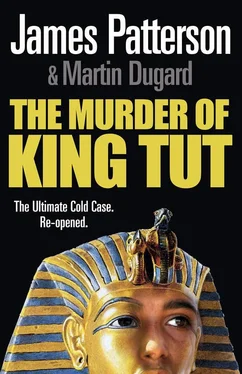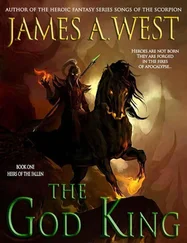All of which made me wonder why anyone would say that Tut had died from a leg fracture.
A contrarian position seemed more likely, and that got me excited. Based on the results of the 2005 report, combined with the 1969 and 1978 X-rays, it appeared that Tut’s leg had not been broken during his lifetime, and that he had suffered a blunt force trauma to the back of the skull.
So if Tut had been murdered, possibly clubbed to death, who did it?
Valley of the Kings
1907
OH, HOW THE MIGHTY had fallen!
Howard Carter stood outside the Winter Palace Hotel with a clutch of watercolors under one arm. His jacket was threadbare, with unsightly patches at the sleeves. The shoes on his feet weren’t much better, the leather unpolished and worn.
He set up his easel near the great marble steps leading up to the hotel lobby, praying that some fool tourist might take a shine to one of his paintings. The sale would net him much-needed money for whiskey and cigarettes, and perhaps even a civilized lunch inside the hotel.
Howard Carter may have become a street bum, but he still had standards.
His problems had begun when he was transferred away from the valley by the Antiquities Service. His new posting, near Cairo, meant that Davis had to find a new executive Egyptologist. Even worse, the ancient tombs at Saqqara proved to be an administrative nightmare for Carter.
When he had allowed his Egyptian tomb guards-quite justifiably-to use force against a drunken mob of French tourists, it became an international incident. After nine months of increasing shame and disgrace, Carter had been forced to resign.
Truth be told, he desperately wanted to get back to the valley. He still hoped to find Hatshepsut’s mummy-and maybe even the ever-elusive virgin tomb.
That tomb, if recent events in the valley were any indication, might belong to a long-forgotten pharaoh named Tutankhamen. King Tut had somehow slipped through the cracks of history-or been purposefully edited from it.
His name was nowhere to be found among the many shrines and temples where the succession of pharaohs had been chiseled in stone. In 1837, British Egyptologist Sir John Gardner Wilkinson had noticed the name on a statue. But other than that single mention, Tutankhamen was virtually unknown.
Ironically, it was the American Theodore Davis-the man Carter had originally persuaded to finance a valley concession-who had stumbled upon interesting new evidence about Tutankhamen.
Valley of the Kings
1907
THE INCREDIBLE STORY, as Carter heard it, began with Theodore Davis and his new chief executive Egyptologist, Edward Ayrton, taking a midday break from the stifling heat.
The valley, as always, was crowded with European tourists eager to see the ancient tombs. Davis was the sort of man who enjoyed being fawned over, but now he ignored the gawking stares that seemed to follow him everywhere.
Davis could hear the distant bray of donkeys from the corral. That chorus mingled with the constant clang of workmen striking their tools into the hard-packed red-yellow soil. Those were the sounds of the valley during dig season, and after four seasons searching for tombs, they were sounds Davis knew quite well.
Davis and Ayrton “owned” the Valley of the Kings, in a manner of speaking. Davis still held exclusive rights to dig there, and with Carter exiled, the Petrie-trained Ayrton was now Davis ’s top man.
The season had been solid so far, with the tomb of the pharaoh Siptah discovered on December 18-the day after Ayrton’s twenty-fifth birthday. Now, the January sun having driven them to find a sliver of shade in the valley’s southwest corner, the two men took a moment to plan their next excavation.
Ayrton smoked quietly as the eccentric Davis stared off into space-or so it appeared.
“My attention was attracted to a large rock tilted to one side,” Davis later recalled, “and for some mysterious reason I felt interested in it.”
The two men trekked back out into the sunlight. The rail-thin Ayrton had just been hired by Davis a few months earlier but was already used to the man’s impulsive behavior.
If Davis wanted to have a look at the rock, then they would have a look at the rock.
Ayrton appraised the boulder from several angles. Then, noticing something peculiar, he dropped to his knees and began moving the loose soil away from the base.
There, buried for ages, was a spectacular find!
“Being carefully examined and dug about with my assistant, Mr. Ayrton, with his hands, the beautiful blue cup was found,” Davis later wrote. The cup was of a glazed material known as faience and, with the exception of a few nicks, was intact.
The ancient Egyptians had used such cups at funerals. This one was stamped with the name of a pharaoh- Tutankhamen.
The cup seemed to imply that this Tutankhamen- whoever he was -had been buried nearby in the Valley of the Kings.
Davis had made his fortune as a lawyer and practiced Egyptology as an avocation, so his techniques were far from typical. He was a short man with a giant white mustache and an evil temper that had led several talented Egyptologists to quit after working with him. There had also been several complaints about the way he ransacked tombs rather than cataloging the contents for history.
But however people felt about Theodore Davis or his methods, there was no denying his Valley of the Kings monopoly. And until it was totally exhausted, he would not give up his concession.
With the “beautiful blue cup” clutched firmly in the palm of his hand, Davis added the name of this mysterious new pharaoh to his list of tombs to be found. And Davis was sure he would be the one to do it.
Howard Carter, making his living selling watercolors to tourists, could do nothing about this new development. He merely stored the information away.
Tutankhamen was out there somewhere just waiting to be found by somebody.
Amarna
1335 BC
THE MORNING SUN, so benevolent and omniscient, blessed Nefertiti as she awaited Tut’s arrival in her private quarters. Akhenaten had been dead for only a few hours. She had already selected a group of “mourners,” women who would openly grieve at her husband’s funeral, beating their exposed breasts and tearing out their hair.
The time had come for the queen and her boy to have a grown-up talk about his future and, indeed, the future of all of Egypt
Nefertiti loved the six-year-old Tutankhamen: his trusting brown eyes, his passion for board games, even his endless questions about why the royal family never traveled to cities like Thebes and Memphis. In fact, Nefertiti adored everything about Tut except for one niggling detail: he wasn’t her son by birth.
As a very bright and practical woman of the times, Nefertiti understood that a pharaoh might have needs that could not be fulfilled by just one woman. But as a passionate queen and a woman unaccustomed to being trifled with, it had infuriated her when Akhenaten had married and impregnated Kiya. The great god Aten had been just and wise when he had taken Kiya’s life as she gave birth to Tut. And Nefertiti made sure that there would never again be a second wife around the royal court.
She had tended to her husband’s every fantasy, and when she couldn’t, Nefertiti directed his affections toward the harem girls, for it was common knowledge that no pharaoh, not even one as outlandish as Akhenaten, would marry a common whore.
So it was that Nefertiti began to raise Tutankhamen as her own.
The boy never knew his real mother, and though he had been told of her life and tragic death, he was still too young to fully comprehend being conceived in the womb of one woman and reared by the loving hands of another.
Читать дальше












